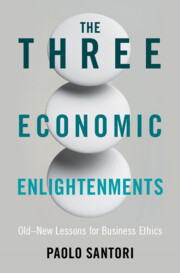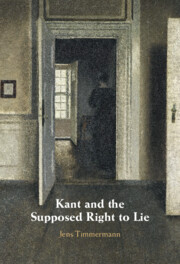Refine search
Actions for selected content:
152 results
Federalism and the Unity of Early Liberalism: Bentham’s and Kant’s Reception of Adam Smith’s “New Imperialism”
-
- Journal:
- Social Philosophy and Policy / Volume 42 / Issue 2 / Winter 2025
- Published online by Cambridge University Press:
- 16 December 2025, pp. 474-494
- Print publication:
- Winter 2025
-
- Article
-
- You have access
- Open access
- HTML
- Export citation
5 - Moral Imagination
-
- Book:
- Moral Imagination in the Twenty-first Century
- Published online:
- 30 October 2025
- Print publication:
- 13 November 2025, pp 97-123
-
- Chapter
- Export citation
3 - Social Constructivism and the Very Idea of a Conceptual Scheme
-
- Book:
- Moral Imagination in the Twenty-first Century
- Published online:
- 30 October 2025
- Print publication:
- 13 November 2025, pp 56-83
-
- Chapter
- Export citation
2 - Genovesi, Kant, and Smith
- from Part I - Political Economy, Civil Economy, Moral Economy
-
- Book:
- The Three Economic Enlightenments
- Published online:
- 04 November 2025
- Print publication:
- 13 November 2025, pp 23-72
-
- Chapter
- Export citation

The Three Economic Enlightenments
- Old–New Lessons for Business Ethics
-
- Published online:
- 04 November 2025
- Print publication:
- 13 November 2025

Kant and Environmental Philosophy
- The Climate Crisis and the Imperative of Sustainability
-
- Published online:
- 01 November 2025
- Print publication:
- 20 November 2025
Chapter 1 - Fichte
- from Part I - Post-Kantian German Idealism
-
- Book:
- Modern Moral Philosophy in the Nineteenth Century
- Published online:
- 15 November 2025
- Print publication:
- 30 October 2025, pp 11-57
-
- Chapter
- Export citation
Chapter 2 - Hegel
- from Part I - Post-Kantian German Idealism
-
- Book:
- Modern Moral Philosophy in the Nineteenth Century
- Published online:
- 15 November 2025
- Print publication:
- 30 October 2025, pp 58-96
-
- Chapter
- Export citation
Chapter 1 - Thought Experiments as Tools of Cognition
- from Part I - The Origins of “Thought Experiment” in Kant and Ørsted
-
- Book:
- Kierkegaard and the Structure of Imagination
- Published online:
- 26 September 2025
- Print publication:
- 16 October 2025, pp 23-34
-
- Chapter
- Export citation
Preface
-
- Book:
- Kant and the Supposed Right to Lie
- Published online:
- 18 July 2025
- Print publication:
- 28 August 2025, pp xi-xvii
-
- Chapter
- Export citation
Chapter IX - Luck and the Imputation of Harm
-
- Book:
- Kant and the Supposed Right to Lie
- Published online:
- 18 July 2025
- Print publication:
- 28 August 2025, pp 159-174
-
- Chapter
- Export citation
Chapter II - Kant’s Duties of Truthfulness
-
- Book:
- Kant and the Supposed Right to Lie
- Published online:
- 18 July 2025
- Print publication:
- 28 August 2025, pp 14-38
-
- Chapter
- Export citation
Chapter X - What Kant Should Have Said
-
- Book:
- Kant and the Supposed Right to Lie
- Published online:
- 18 July 2025
- Print publication:
- 28 August 2025, pp 175-188
-
- Chapter
- Export citation
Chapter III - The Story of Kant’s Essay
-
- Book:
- Kant and the Supposed Right to Lie
- Published online:
- 18 July 2025
- Print publication:
- 28 August 2025, pp 39-55
-
- Chapter
- Export citation
Chapter VII - Form and Matter
-
- Book:
- Kant and the Supposed Right to Lie
- Published online:
- 18 July 2025
- Print publication:
- 28 August 2025, pp 107-129
-
- Chapter
- Export citation
Chapter VI - A Right to the Truth in Another?
-
- Book:
- Kant and the Supposed Right to Lie
- Published online:
- 18 July 2025
- Print publication:
- 28 August 2025, pp 98-106
-
- Chapter
- Export citation
Chapter VIII - Kant’s Argument against Constant
-
- Book:
- Kant and the Supposed Right to Lie
- Published online:
- 18 July 2025
- Print publication:
- 28 August 2025, pp 130-158
-
- Chapter
- Export citation
Chapter I - Introduction
-
- Book:
- Kant and the Supposed Right to Lie
- Published online:
- 18 July 2025
- Print publication:
- 28 August 2025, pp 1-13
-
- Chapter
- Export citation
Chapter 1 - Context
-
- Book:
- The Cambridge Introduction to Jacques Lacan
- Published online:
- 17 July 2025
- Print publication:
- 31 July 2025, pp 1-20
-
- Chapter
- Export citation

Kant and the Supposed Right to Lie
-
- Published online:
- 18 July 2025
- Print publication:
- 28 August 2025
